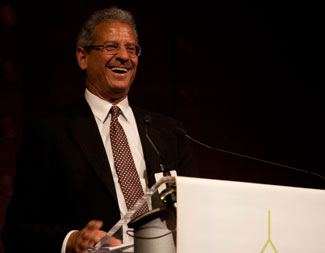Categories: Network Events
10.31.2013
Full text of Dr. Lipton's speech while accepting our Tim O'Hanlon Unsung Hero of the Year award
 Frank Lipton has left an indelible mark on the supportive housing community. The recipient of our 2013 Tim O'Hanlon Unsung Hero of the Year Award, Dr. Lipton has served for decades at the NYC Human Resources Administration. He delivered the following speech, one of the widest-ranging and most moving we've heard at our 2013 Awards Gala on October 16. With his permission, we've printed it here in full. For a greater picture of Dr. Lipton's contributions to supportive tenants and providers, see here. Transcript:
Frank Lipton has left an indelible mark on the supportive housing community. The recipient of our 2013 Tim O'Hanlon Unsung Hero of the Year Award, Dr. Lipton has served for decades at the NYC Human Resources Administration. He delivered the following speech, one of the widest-ranging and most moving we've heard at our 2013 Awards Gala on October 16. With his permission, we've printed it here in full. For a greater picture of Dr. Lipton's contributions to supportive tenants and providers, see here. Transcript:
This is a wonderful honor. When I received Bill [Traylor]’s email informing me that Network was going to recognize me with Tim O’Hanlon’s Unsung Hero award, I had to read it twice as it was so poetic and inspirational that I couldn’t believe he was really talking about me. I was truly moved and began to go over the path that has landed me here tonight at Capitale, a great space where over the years I’ve had the good fortune of dining and dancing.
I cannot accept this award without first recognizing Mayor Bloomberg, HRA Commissioner Robert Doar and former Commissioner Verna Eggeleston, all of whom are signatories to the NY/NY III Agreement. I want to also recognize former Commissioner Bill Grinker who made the first NY/NY Agreement happen in 1990. Thanks Bill for being here tonight! And thank you Pat Smith, HRA’s First Deputy, for your ongoing guidance and support.
These agreements would not have been possible were it not for the groundbreaking contributions of supportive housing’s pioneers, who are here tonight, notably the Fathers John [Felice and McVean], Ellen Baxter, Tony Hannigan and Laura Jervis.
I must give special tribute to Jim Rice, who was an Assistant Commissioner at the former City Department of Mental Hygiene. Jim, who passed away almost seven years ago, spearheaded the development of some of the City’s first programs for homeless mentally ill individuals. He was truly visionary when he funded the on-site services in what would become the first supportive housing programs in the country.
As a once young physician overseeing psychiatric emergency services at Bellevue Hospital in the '80s, I witnessed the emerging plight of the homeless, mentally ill on a daily basis. Firsthand exposure to supportive housing, which didn’t even have a name, was provided to me by the staff and tenants at the first St. Francis thanks to the mentorship of Dr. Al Sabatini.
During a research study at the just opened second St. Francis supportive housing program, I came to know a homeless man who I will call Dave. Dave was mute, and had been living on the streets for years covered in blankets, even in the heat of summer. After being hospitalized at Bellevue, he was randomly selected and despite his resistance moved into his new home in this freshly renovated building.
While he remained housed for many years, with no further hospitalizations or episodes of homelessness, he continued to be relatively isolated and uncommunicative. Years later, out of the blue, I received a call from Dave who wanted to thank me and let me know that he had been reunited with his family with whom he was living. While his words remained sparse, they were clearly heartfelt, helping me to further grasp the enormous power of supportive housing.
With healthcare reform and Medicaid redesign dramatically changing the landscape of service delivery, I feel obligated to set the record straight. For its pioneering advances in coordinating care, improving health outcomes, decreasing institutional costs and fostering residential stability supportive housing deserves to be recognized as the true unsung hero.
Looking forward, the evolving healthcare environment is filled with opportunities and risks. The supportive housing community can take advantage of the moment by expanding services to other populations, developing innovative new models and broadening its efforts to emphasize personal responsibility, independent living and community integration.
May the supportive housing community live long and prosper. Thanks to all of you for this tremendous honor!
